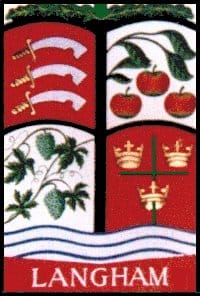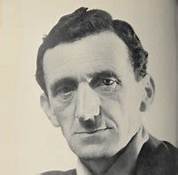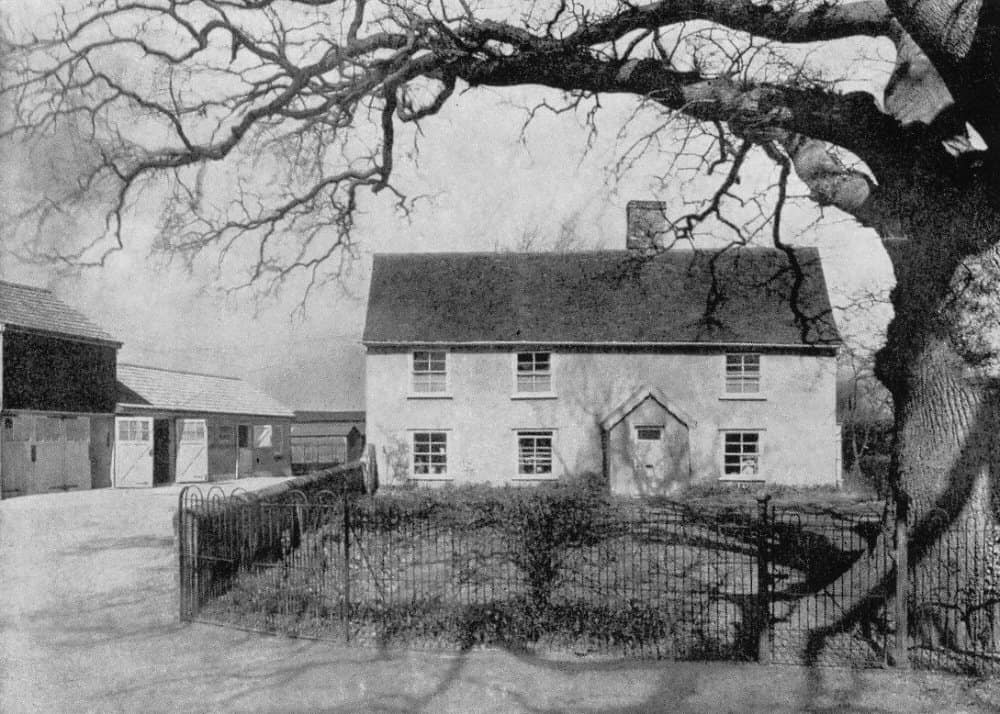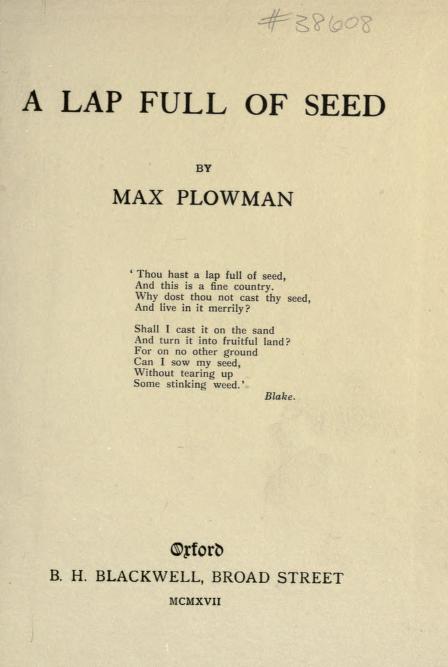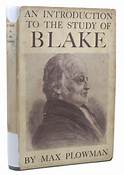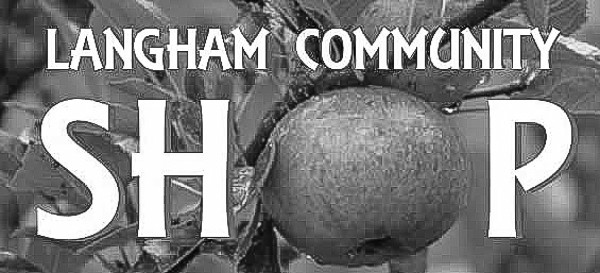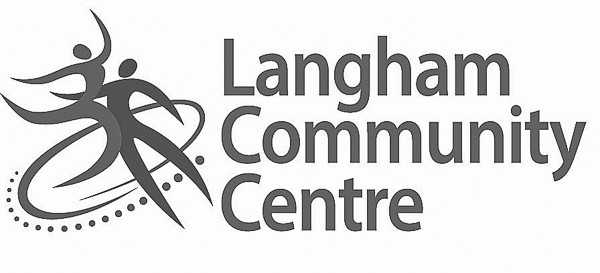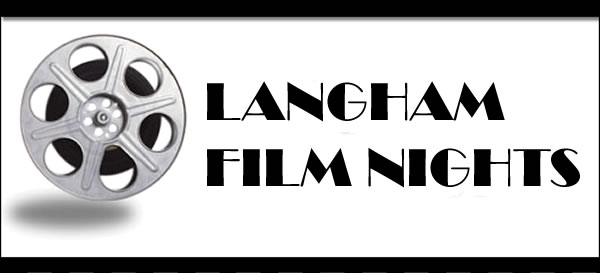MAX PLOWMAN
MAX PLOWMAN
1 September 1883 - 3 June 1941
The Oaks & Little Oaks, School Road, 1939-41
1 September 1883 - 3 June 1941
The Oaks & Little Oaks, School Road, 1939-41
Max Plowman was born in Tottenham into a prosperous family of Plymouth Brethren. After ten years in the family brick-making business he came to regard commerce as warfare under another name and took to journalism and writing Romantic poetry. By the outbreak of WW1, he was well known for both his studies of William Blake and his own poetry (see A Lap Full of Seed, 1917).
In WW1 Plowman was commissioned into the army and saw action in the Battle of the Somme but became increasingly doubtful of the morality of war. After treatment for shell-shock, he resigned his commission but was dismissed from the army. His tract War and the Creative Impulse (1919) defined the pacifism he asserted for the rest of his life. He published an account of his Western Front experiences in A Subaltern on the Somme (1927).
In 1929 Plowman met John Middleton Murry, a prominent literary critic, writer and militant socialist, and joined him in developing The Adelphi, a socialist literary monthly to which D H Lawrence and George Orwell were contributors.
A Christian but adhering to no denomination, Plowman was a sponsor and the first General Secretary of the Peace Pledge Union (PPU) formed in 1935. His book The Faith Called Pacifism (1936) converted Murry to pacifism, thereby triggering the collapse of Murry’s short-lived socialist Adelphi Centre at The Oaks. He subsequently persuaded the PPU to put pacifism to practical purpose by offering The Oaks to house 53 of the 4,000 Basque children and their teachers brought to Britain in 1937 during the Spanish Civil War.
On the departure of the children in 1939, Plowman brought a band of young conscientious objectors to The Oaks to restore the building and re-constitute the Adelphi Centre, this time ‘for the instruction of students in……the science and art of practical and personal living, as a pacifist, in a totalitarian world’. At Christmas, Plowman moved into Little Oaks, where he was joined by his wife and son and where he lived until his death. On the land round the two houses he established a market garden and communal farm, promoted in pacifist circles as theLangham Voluntary Service Scheme.
Under Plowman’s wardenship the revived Adelphi Centre also became a place for lectures and discussions on social, religious and pacifist themes and a sanctuary for left-wing and pacifist intellectuals to enjoy temporary relief from wartime gloom. It was sustained financially by the PPU and its members, by adherents of The Adelphi magazine (which Plowman edited and published from Little Oaks) and by Plowman’s own journalistic output. The market garden was sustained professionally by Golden Byles and Alfie Barrell, Langham men who had previously been employed by General Mullens. Its chronic precariousness was not eased by Plowman’s housing at The Oaks 60 elderly and infirm evacuees from the London Blitz.
Plowman’s unflagging commitment to the Adelphi Centre and the magazine did not distract him from endless committee work and public speaking for the PPU, publishing innumerable articles and conducting voluminous and thoughtful correspondence. He died, exhausted, of pneumonia at Little Oaks on 3rd June 1941. His grave is in Langham Churchyard.
In WW1 Plowman was commissioned into the army and saw action in the Battle of the Somme but became increasingly doubtful of the morality of war. After treatment for shell-shock, he resigned his commission but was dismissed from the army. His tract War and the Creative Impulse (1919) defined the pacifism he asserted for the rest of his life. He published an account of his Western Front experiences in A Subaltern on the Somme (1927).
In 1929 Plowman met John Middleton Murry, a prominent literary critic, writer and militant socialist, and joined him in developing The Adelphi, a socialist literary monthly to which D H Lawrence and George Orwell were contributors.
A Christian but adhering to no denomination, Plowman was a sponsor and the first General Secretary of the Peace Pledge Union (PPU) formed in 1935. His book The Faith Called Pacifism (1936) converted Murry to pacifism, thereby triggering the collapse of Murry’s short-lived socialist Adelphi Centre at The Oaks. He subsequently persuaded the PPU to put pacifism to practical purpose by offering The Oaks to house 53 of the 4,000 Basque children and their teachers brought to Britain in 1937 during the Spanish Civil War.
On the departure of the children in 1939, Plowman brought a band of young conscientious objectors to The Oaks to restore the building and re-constitute the Adelphi Centre, this time ‘for the instruction of students in……the science and art of practical and personal living, as a pacifist, in a totalitarian world’. At Christmas, Plowman moved into Little Oaks, where he was joined by his wife and son and where he lived until his death. On the land round the two houses he established a market garden and communal farm, promoted in pacifist circles as theLangham Voluntary Service Scheme.
Under Plowman’s wardenship the revived Adelphi Centre also became a place for lectures and discussions on social, religious and pacifist themes and a sanctuary for left-wing and pacifist intellectuals to enjoy temporary relief from wartime gloom. It was sustained financially by the PPU and its members, by adherents of The Adelphi magazine (which Plowman edited and published from Little Oaks) and by Plowman’s own journalistic output. The market garden was sustained professionally by Golden Byles and Alfie Barrell, Langham men who had previously been employed by General Mullens. Its chronic precariousness was not eased by Plowman’s housing at The Oaks 60 elderly and infirm evacuees from the London Blitz.
Plowman’s unflagging commitment to the Adelphi Centre and the magazine did not distract him from endless committee work and public speaking for the PPU, publishing innumerable articles and conducting voluminous and thoughtful correspondence. He died, exhausted, of pneumonia at Little Oaks on 3rd June 1941. His grave is in Langham Churchyard.

